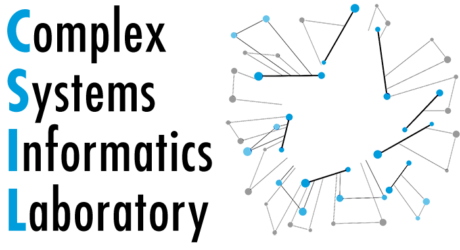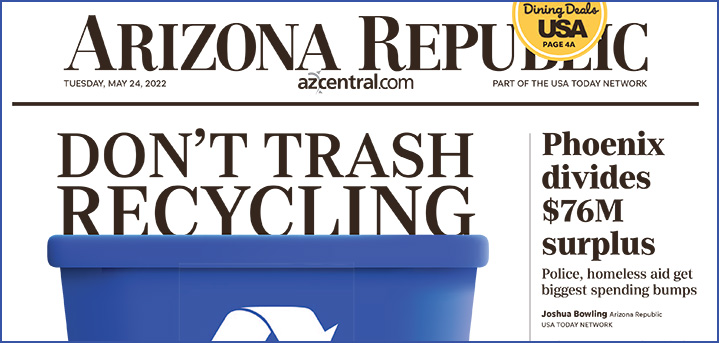Printed TUESDAY, MAY 24, 2022 | Alison Steinbach Arizona Republic | USA TODAY NETWORK
Download the full article PDF here.
“If we’re going to make a difference for generations to come, we have to start thinking about the circular economy, recycling.”
—Laura Malone, director of the waste programs division at the Arizona Department of Environmental Quality
There are far more recyclable goods out there than actually make it in the blue bin.
And Arizonans throw out much of what they use, even though most of the material doesn’t have to go to a landfill. Now, university researchers want to show that a future is possible where recycling is both a profitable local industry and good for the planet.
If everything that is recyclable actually was — and with new regional systems designed to support that — recycling could be economically feasible for local communities, the researchers from Arizona State University and Northern Arizona University say.
A new $1.6 million grant from the Arizona Board of Regents will allow for groundbreaking statewide research on the issue.
Recycling has seen rising costs and lower buy-in from cities in recent years after China in 2018 stopped importing many recycled materials and local options dwindled, leaving cities skeptical as they faced rising costs for selling paper and plastic goods.
A handful of Arizona cities stopped recycling altogether or limited what could go in blue bins. Many municipalities don’t know what their future of recycling looks like.
“With the ban on sending things to China, and COVID, I just think everybody’s struggling with what’s best and how to do it,” said Laura Malone, director of the waste programs division at the Arizona Department of Environmental Quality.
“If we’re going to make a difference for generations to come, we have to start thinking about the circular economy, recycling,” Malone said. “By using recycling bins appropriately, we can make a difference every day.”
Researchers from ASU and NAU believe the future outlook for recycling is the future outlook for recycling is promising, and they’re making computer models to understand options across the state and their possible economic impacts.
They are starting work on a three-year project funded as part of a new Arizona Board of Regents grant program using sales tax money for applied research projects. Teams from across the three state universities are working with state agencies to solve some of Arizona’s most pressing challenges from contaminated water to high ozone levels, in addition to recycling.
“We’re sort of the state’s think tank in this regard,” said Regent Fred DuVal, who came up with the idea for the Regents’ Grant program.
When Arizonans spend money at the cash register, some cents from every purchase go toward research at state universities. The new grant effort seeks to ensure residents get the biggest bang for the buck. The idea is that the research universities are using their expertise to help the state with solutions and explain to taxpayers how the investment is improving their lives. That type of collaboration is new in Arizona.
DuVal likes to use what he calls the “Circle K test” to think about grant funding. When someone is in line buying a cup of coffee, can he clearly explain to them what the universities are doing with that sales tax to make their lives better?
Students pay tuition and get a degree; the state makes budget investments and gets a workforce; donors contribute and get a tax deduction. The public gives the universities sales tax money and now these research projects help show their return on investment, DuVal said.
The recycling team will evaluate the potential for recycling in Arizona and model how cities could continue recycling in a financially sustainable way. What’s the economic impact of recycling today and what’s the potential? Would regional recycling make more sense than city-by-city? What about the costs versus the benefits for smaller and larger communities?
The recycling research will be the first statewide assessment of those questions, according to the researchers, who will work in collaboration with ADEQ. And they believe it’s urgently important.
“We’re living like we have a second earth to extract resources from and we don’t,” said Rajesh Buch from ASU’s Rob and Melani Walton Sustainability Solutions Service.
“From a sustainability standpoint, we need to extract those materials and bring them back into the economy. We can create jobs, they don’t harm the planet and it becomes a better way to support our economy.”
Buch and his research partner from NAU, Richard Rushforth, an assistant research professor in the School of Informatics, Computing, and Cyber Systems, are using the $1.6 million grant to build computer models and tools to analyze recycling options for different-sized communities and their economic im- pacts.
“How can we create jobs in rural communities that are high-paying jobs, jobs that provide good livelihood and also have that positive impact on our environment,” Rushforth said of the research’s potential impact.
How to make recycling feasible
Much of the research will model and analyze the current state of, and future potential for, recycling in Arizona.
First is understanding the amount of recyclable material that’s actually out there — in other words, what’s the potential for recycling in each city and town? The idea is there are massive amounts of recyclables that don’t make it in blue bins, either because people toss them in the trash or because places don’t offer recycling programs.
Nationally, about two-thirds of waste collected goes to landfills, but 70-90% of material is actually recyclable, Buch estimated.
“That plastic, the glass, the paper … all of that can be converted to valuable materials, but today it’s not. But to recover that material, you have to put processes in place, you have to create jobs, you have to attract companies, and all of that’s going to create jobs and stimulate the economy,” he said.
Arizona counties recycled about 300,000 tons of material in 2020, according to ADEQ data, although the state does not require localities report on recycling so that picture may be incomplete.
“Just the city of Phoenix every year landfills about 1 to 1.2 million tons of material,” Buch said. “Our project is going to try to get to those numbers as best we can to figure out the true potential for recycling. Is this number, 300,000, is that really 3 million? Is it 10 million? What could it be? Imagine the number of jobs that might create if we’re off by a factor of 10.”
Malone from ADEQ said increasing recycling is essential for a sustainable planet in the future.
“What I want citizens to look at is when they put a plastic bottle in the trash, that is just trash forever that will sit in the landfill and never break down. But if they put a plastic bottle in the recycling bin, that becomes another plastic bottle or part of a tire or part of a road. … They can make a difference in the future for their kids.”
Based on community make up, the team will analyze what amount of various materials could be recovered and recycled above and beyond what currently is, and will map waste streams to see how materials move in communities.
“We’d like to build a data portal or a visualization portal for community members or decision-makers to access the information that we’re producing as part of the project to see what’s possible within their communities currently and what it would look like as you develop regional hubs around certain recycled materials,” Rushforth said.
One approach that could work, and that’s already getting studied with separate funding, is a “hub and spoke” model. Larger cities in more rural regions would take all the recycling from neighboring communities that aren’t currently recycling and process it together in centralized facilities. Buch said they may try to identify areas where that could work and pilot it to see if it stimulates recycling.
DuVal said the recycling project was chosen because recycling will be a huge problem in years ahead, but it hasn’t yet reached the critical mass to get significant political attention. And nobody had the assignment to figure out what to do about recycling, he said.
Boosting the local economy
Once the actual quantity of recyclables and their paths are clear, the researchers plan to look at economic impact — both today, and then based on estimates of recyclables that are available but not currently diverted. They will estimate how many jobs could be created if recycling services were expanded and accessible to everyone. The team will model financially the costs and benefits if more communities recycled.
Given the amounts and locations of recyclable materials out there, what companies could Arizona attract and where might they locate to handle all the plastics, paper and glass?
Buch said he hopes the analysis will show a “massive opportunity” for recycling and arm decision-makers with tools to understand what the industry could look like across the state.
Ideally, the research will have an impact beyond Arizona, Rushforth said. He said state-by-state data on recycling is patchwork or nonexistent, so this research could be useful for other states to reproduce.
If people have a clear sense of where their recyclables end up, that they’re actually producing new material and that it’s benefiting their community economically in the process, they’ll likely recycle more.
“If I have no confidence in knowing where it’s going, it’s easy to see how people get discouraged. I want this project to serve that goal in encouraging and stimulating economic development that ultimately changes consumer behavior,” Rushforth said.
Research funded by sales tax
The recycling project’s $1.6 million budget comes from a pool of sales tax money the Board of Regents has newly set aside to fund research solutions to these large statewide challenges.
The board last month allocated about $12 million across five projects — the recycling analysis plus projects that aim to improve air quality, control dust, remove chemicals from water and manage abandoned mine waste. The Regents will fund additional three-year projects with $12 million more in the years ahead.
The money is from Proposition 301, which Arizona voters passed in 2000 to increase the state’s sales tax by 0.6 cents to raise money for K-12, community colleges and public universities. Law-makers and Gov. Doug Ducey extended it for another 20 years in 2018.
Staff from the Board of Regents worked with the Governor’s Office and state agencies like ADEQ and the Department of Health Services on problem statements for significant statewide challenges, which identified by the state determined the first round of grants. More state agencies are expected to participate in the coming years as additional projects are funded.
Have a story about higher education? Reach the reporter at Alison.Stein- bach@arizonarepublic.com or at 602-444-4282. Follow her on Twitter @alisteinbach.


